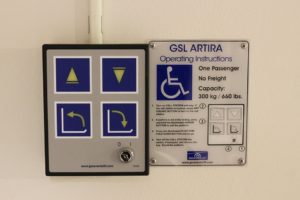
The operating panel for the new wheelchair lift in College Hall has yet to be used.
Raymond Arke | News Editor
01/25/18
A new stair lift installed during Christmas break in College Hall will help disabled students more easily access the building — if the university makes it operational.
The $40,000 lift has remained dormant since crews installed it to the dismay of some students who are eagerly awaiting its assistance.
“It would cut my commute by 10 to 15 minutes, especially during inclement weather,” said graduate student Grant Stoner, who uses a wheelchair due to spinal muscular atrophy Type 2. “I’m not upset at university, but it is disappointing that it is here but I can’t use it.”
It was unclear when the lift would be working but University officials did say that the lift was added after campus survey results indicated its need.
Rod Dobish, assistant vice president and chief facilities officer for Duquesne, said the lift was added after “a survey of College Hall indicated that there was a need to access the building’s upper floors internally from the Locust Street level without having to exit the building.”
“College Hall has always been accessible from Locust Street into the first floor for access to all of the rooms on that level and from Academic Walk onto the second floor, which leads directly to the elevator lobby and the building’s four elevator cars,” Dobish said.
Stoner, who is a A&E writer for The Duke, said Duquesne has always been mindful of his needs but traversing College Hall has been challenging.
“Duquesne is very accommodating with moving classrooms. They have always moved classrooms if I needed it … made events accessible,” Stoner said.
Normally, if Stoner has class in College Hall, he has to take a convoluted route from Locust Garage through the Student Union and onto Academic Walk. The path between College Hall and the Student Union can sometimes be traversed, but during bad weather it can be “troubling,” Stoner said.
“Freshman year I had one class [on the first floor of College Hall] and one upstairs and I was always 15 minutes late,” he said.
Stoner has gotten used to the Bluff’s hills in attending classes.
“Pittsburgh is inaccessible because of the hills … it’s not anybody’s fault. I’m so used to it … I’m not going to die angry about it,” he said.
He uses a wheelchair because condition affects his muscular system.
“My mother and father were carriers of a gene for muscular atrophy. There was a 1-in-4 chance I would get it, and I won the … lottery,” Stoner said. “[Muscular atrophy] weakens all the muscles in the body progressively throughout life. No one knows the rate for how fast it progresses,” he said.
Dobish said that the lift was installed and manufactured by Garaventa USA, a “world-class manufacturer” for specialized lifts and elevators, according to their website.
“Duquesne University maintenance staff installed the electrical power to this lift and also patched and painted the walls afterwards,” he said. “The Facilities Management team is always looking to maintain or improve the campus in all ways, including accessibility when the conditions are warranted.”
University Public Affairs did not immediately respond by press time to a question about when the lift will be operational.


